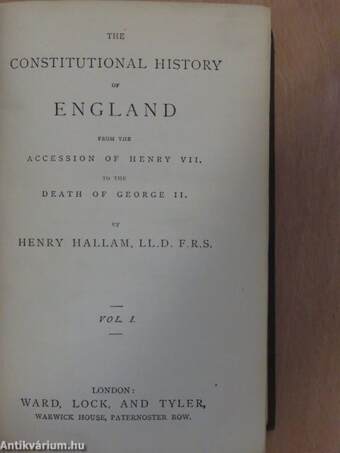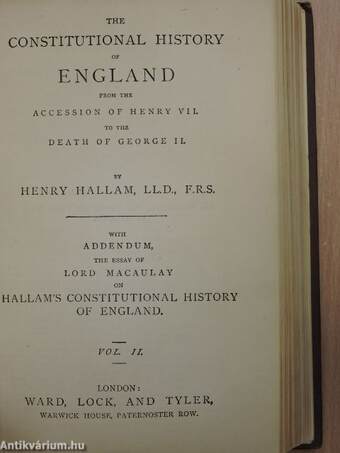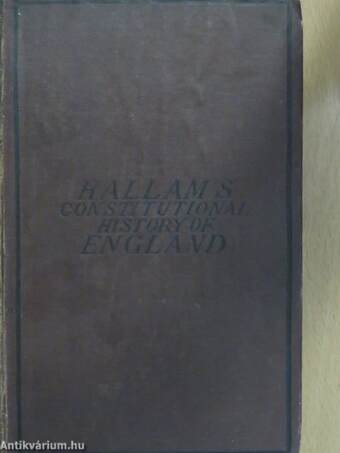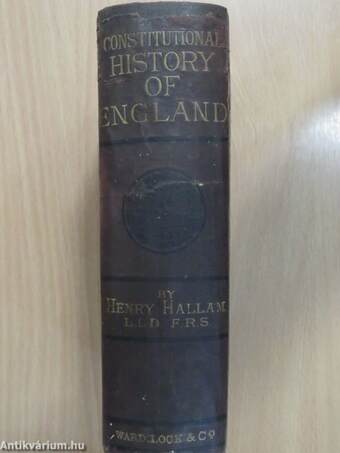1.067.285
kiadvánnyal nyújtjuk Magyarország legnagyobb antikvár könyv-kínálatát

VISSZA
A TETEJÉRE
JAVASLATOKÉszre-
vételek
The constitutional history of England I-II.
From the accession of Henry VII. to the death of George II./VII. Henrik csatlakozásától II. György haláláig
| Kiadó: | Ward, Lock and Tyler |
|---|---|
| Kiadás helye: | London |
| Kiadás éve: | |
| Kötés típusa: | Vászon |
| Oldalszám: | 970 oldal |
| Sorozatcím: | |
| Kötetszám: | |
| Nyelv: | Angol |
| Méret: | 19 cm x 13 cm |
| ISBN: | |
| Megjegyzés: | Két kötet egy könyvbe kötve. Nyomtatta Bradbury, Agnew & Co., London. |
naponta értesítjük a beérkező friss
kiadványokról
naponta értesítjük a beérkező friss
kiadványokról
Előszó
PREFACE.
The origin and progress of the English Constitution, down to the extinction of the house of Plantagenet, förmed a considerable portion of a work published by me somé years since, on the... Tovább
Előszó
PREFACE.
The origin and progress of the English Constitution, down to the extinction of the house of Plantagenet, förmed a considerable portion of a work published by me somé years since, on the history, and espe-cially the laws and institutions, of Europe during the period of the Middle Ages. It had been my first intention to have prosecuted that undertaking in a generál continuation ; and when experience taught me to abandon a scheme projected early in life with very inadequate views of its magnitude, I still determined to carry forward the constitutional history of my own country, as both the most important to ourselves, and the most congenial to my own studies and habits of mind.
The title which I have adopted appears to exclude all matter not referrible to the state of government, or what is loosely denominated the constitution. I háve, therefore, generally abstained from mentioning, except cursorily, either military or political transactions, which do not seem to bear on this primary subject. It must, however, be evident, that the constitutional and generál history of England, at somé periods, nearly coincide ; and I presume that a few occasional deviations of this nature will not be deemed unpardonable, especially where they tend, at least indirectly, to illustrate the main topic of inquiry. Nor will the reader, perhaps, be of opinion that I have forgottén my theme in those parts of the following work which relate to the establishment of the English church, and to the proceedings of the state with respect to those who have dissented from it; facts certainly belonging to the history of our constitution, in the large sense of the word, and most important in their application to modern times, for which all knowledge of the past is principally valuable. Still less apology can be required for a slight verbal inconsistency with the title of these volumes in the addition of two supplemental chapters on Scotland and Ireland. This indeed I mention less to obviate a criti-cism, which possibly might not be suggested, than to express my regret that, on account of their brevity, they are both so disproportionate to the interest and importance of their subjects.
During the years that, amidst avocations of different liinds, have been occupied in the composition of this work, several others have been given tö the world, and have attracted considerable attention, relating particularly to the periods of the Reformation and of the civil wars. It seems necessary to mention that I have reád none of these, till after I had written such of the following pages as treat of the same subjects. The three first chapters indeed were finishedin 1820, before the appear-ance of those publications which have led to so much controversy as to the ecclesiastical history of the sixteenth century ; and I was equally unacquainted with Brodie's " Hist. of Brit. Em. from the Accession ov Ch. I. to the Restoration," while engaged myself on that period. 1 have, however, on a revision of the present work, availed myself of the valuable labours of recent authors, especially Lingard and Brodie; and in several of my notes I have sometimes supported myself by their authority, sometimes taken the liberty to express my dissent; but I have seldom thought it necessary to make more than a few verbal modifications in my text. Vissza
Tartalom
CONTENTS.
CHAP. I.—ON THE ENGLISH CONSTITUTION FROM HEN. VII. TO MARY.
Aticient Government of Efigland—Limitations of Royal Authority— Difference ifi the effective Operation of these—Sketch of the State of Society and Law—Henry VII.—Statute for the Security of the Subject under a King de facto—Statute of Fines—Discussion of its Effect and Motive—Exactions of Money under Henry VII.—Taxes demanded by Henry VIII.—Illegal Exactions of Wolsey in 1523 and 1525—Acts of Parliament releasing the King from his Debts— A Benevolence again exacied—Oppressive Treatment of Reed— Severe and unjust Executionsfor Treason—Earl of Warwick—Earl ofSuffolk—Duke of Buckingham—New Treasons created by Statute —Executions of Fisher and More—Cromwell—Duke of Norfolk— Anne Boleyn—Fresh Statutes enacting the Penalties of Treason— Act giving Proclamations the Force of Law—Government of Edward VI.'s Counsellors—Attainder of Lord Seymour and Duke of Somerset — Violence of Mary's Reign—The House of Commons recovers Part of its independent Power in these two Reigns—Attempt of the Court to strengtlien itself by creating new Boroughs—Causes of the Higli Prerogative of the Tudors—Jurisdiction of the Council of Star-Cliamber—This not the same with the Court ereded by Hen. VII.— Influence of the Authority of Star-Chamber in enhancing the Royal Power—Tendency of religious Disputes to the same End. pp. 17-54.
CHAP. II.— ON THE ENGLISH CHURCH UNDER HENRY VIII., EDWARD VI., AND MARY.
State of Public Opinion as to Religion—Henry VIII.'s Controversy with Luther—His Divorce from Catherine—Separation from the Cliurcli of Romé—Dissolution of Monasteries—Progress of the Re-formed Doctrine in England—Its Establishment under Edward— Sketch of the chief Points of Difference between the two Religions— Opposition made by Part of the Nation—Cranmer—His Moderation in introducing Changes not acceptable to Zealots—Mary—Persecu-tion under her—Its Effect favourable to Protestantism. pp. 54-88.
CHAP. III.—ON THE LAWS OF ELIZABETH'S REIGN RESPECTING THE
ROMÁN CATHOLICS.
Ckange of Religion 011 the Queen's Accession—Acts of Supremacy and Uniformity—Restraint of Román Catholic Worship Í11 the first Years of Elizabeth—Statute of 1562—Speech of Lord Montague against it —This Act not fully enforced—Application of the Emperor in behalf of the English Catholics— Persecution of this Body in the ensuing Period—Uncertain Succession of the Crown between the Faműies of
Scotland and Sitffolk—The Queen's unwilhngness to decide this, or to marry—Imprisonment of Lady Katherine Gray—Mary Queen of Scotland—Combination in her Favour—Bull of Pius V.—Statutes for thc Queerís Security—Catholics more rigorously treated—Refugees in the Netherlands—Their Hostility to the Government—Fresh Laws against the Catliolic Worship—Execution of Campiaii and others— Defence of the Queen by Burleigh—Increased Severity of the Government—Mary—Plot in her Favottr—Her Execution—Remarks upon it—Persecution of Román Catholics—Observations. pp. 88-130.
CHAP. IV.—0N THE LAWS OF ELIZABETH'S REIGN RESPECTING PROTESTANT NONCONFORMISTS.
Origin of the Differences among the English Protestants—Religious Inclinations of the Queen—Unwillingness of many to comply with the established Ceremonies—Conformity enforcedby the Archbishop— Against the Disposition of others—A more determined Opposition, about 1570, led by Cartwright—Dangerous Natúre of his Tenets— Puritatis supported in the Commons—and in somé Measure by the Council-—Prophesyings—Arclibishops Grindal and Whitgift—Con-duct of the latter in enforcing Conformity—High Commission Court —Lord Burleigh averse to Severity—Puritán Libels—Attempt to set vp Presbyterian System—House of Commons averse to episcopal Authority—Independents liable to severe Laws—Hooker's Eccle-siastical Polity—Its Character—Spoliation of Cliurch Revenues— Remarks—Walsingham in Defence of the Government, pp. 130 169.
CHAP. V.—ON THE CIVIL GOVERNMENT OF ELIZABETH.
General Remarks—Defective Security of the Subject's Liberty—Trials for Treason and other political Offences unjustly conducted—Illegal Commitments—Remonstrance ofjudges agai?ist them—Proclamations unwarranted by Law—Restrictions on Printing—Martial Laiu— Loans of Money not quite voluntary—Character of Lord BurleigJis Administration—Disposition of the House of Commons—Addresses concerning the Succession—Difference on this between the Queen and Commons in 1566—Session of 1571—Influence of the Puritans in Parliament—Speech of Mr. Wentworth in 1576—The Commons continue to seek Redress of ecclesiastical Grievances—Alsó of Mo-nopolies, especially in the Session ofi 601—Lnfluence of the Crown in Parliament—Debate on Election of non-resident Burgesses—Asser-tion of Privileges by Commons—Case of Ferrers, under Henry VIII. — Other Cases of Privilege—Privilege of determining contested Elec-tions claimed by the House—The English Constihition not admitted to be an absolute Monarchy—Pretensions of the Crown. pp. 169-206.
CHAP. VI.—ON THE ENGLISH CONSTITUTION UNDER JAMES I.
Quiet Accession of James—Qaestion of his Title to the Crown—Legiti-macy of the Earl of Hertford's Issue—Early Unpopularity of the King—Conduct towards the Puritans—Parliament convoked by an irregular Proclamation—Question of Fortescue and Goodwin's Elec-
tion—Shirley's Case of Privilege—Complaints of Grievances—Com-mons' Vindication of themselves—Session of 1605—Union with Scotland debated—Contimial Bickerings between the Crown and Commons—Impositions 011 Merchandise witliout Conscnt of Parlia-ment—Remonstrances against these in Session 1610—Doctrine of King's absolute Power inculcated by Clergy—Articuli cleri—Cowell's Interpreter—Renewed Complaints of the Commons—Negotiation for giving up the feudal Revenue—Dissolution ofParliament— Character of James—Death of Lord Salisbury—Foreign Politics of the Government—Lord Coke's Alienation from the Court—Illegal Proclamations —Means resorted to in order to avoid the Meeting of Parliament¦— Parliament of 1614—Undertakers—It is dissolved without passing a single Act—Benevolences—Prosecution of Peacham—Dispute about the Jurisdiction of the Court of Chancery—Case of Commendams— Arbitrary Proceedings in Star-Chamber—Arabella Stuart—Somerset and Overbury—Sir Waltér Raleigh—Parliament of 1621—Proceedings against Mompesson and Lord Bacon— Violence in the Case of Floyd—Disagreetnent between the King and Commons—Their Dissolution, after a strong Remonstrance—Marriage Treaty with Spain —Parliament of 1624—Impeachment of Middlesex. pp. 206-266.
CHAP. VII.—THE ENGLISH CONSTITUTION FROM ACCESSION OF CHARLES I. TO THE DISSOLUTION OF HIS THIRD PARLIAMENT.
Parliament of 1625—Its Dissolution—Another Parliament called— Prosecution of Buckingham—Arbitrary Proceedings towards the Far Is of Arundel and Bristol—Loan demanded by the King—Several committed for Refusal to contribute—They sue for a Habeas Corpus —Arguments on this Question, which is decided against tliem—A Parliament called in 1628—Petition of Right—King's Reluctance to grant it—Tonnage and Poundage disputed—King dissolves Parliament—Religious Differences—Prosecution of Puritans by Bancroft— Growth of High-Church Tenets—Differences as to the Observa7ice of Sunday—Arminian Controversy—State of Catholics under James— Jealousy of the Court's Favour towards them—Unconstitutional Tenetspromulgated by High-Church Party—Remarks. pp. 266-297
CHAP. VIII.— FROM THE DISSOLUTION OF CHARLES'S THIRD PARLIAMENT TO THE MEETING OF THE LONG PARLIAMENT.
Declaration of the King after the Dissolution—Prosecutions of Eliot and others for Conduct in Parliament— Of Chambers for refusing to pay Customs—Commendable Behaviour of Judges in somé l7istances —Means adopted to raise the Reve7iue—Co77ipositio7is for K7iighthood —For est Laws—Monopolies—Ship Money—Exte7isio7i ofit to inla7id Places—Ha77ipde7is Refusal to pay—Argume7its on the Case—Pro-cla77iations—Various a7'bitraiy ProceedÍ7igs—Sta7'-Cha7/iber Jurisdiction—Pu7iish7ne7its Í7iflicted by it—Cases of Bishop Willia77is, Prynne, etc.—Laud, his Character—Lo7'd Strafford—Correspo7ide7ice between these two—Co7iduct of Laiid in the Church-Prosecution of Purita7is—Favour shown to Catholics—Te7ide7icy to their Religio7i—
Expectations entert, tíned by them—Mission of Panzani—Intrigue of Bishop Montagu with him—Chillingworth—Hales—Character of Clarendon's Writings—Animadversions on his Account of this Period —Scots Troubles, and Distress of the Government—Parliament of April, 1640—Council of York—The Lons; Parliament. pp. 297-359.
CHAP. ix.—FROM THE MEETING OF THE LONG PARLIAMENT TO THE BEGINNING OF THE CIVIL WAR.
Character of the Long Parliament—Its salutary Measures—Triennial Bili—Other beneficial Laws—Observations—Impeachment of Straf-ford—Discussion of its Justice—Act against Dissolution of Parliament without its Consent—Innovations meditated in the Church— Schism in the Constitutional Party—Remonstrance of November 1641 —Suspicions of the King's Sincerity—Question of the Militia— Historical Sketch of Military Force in England—Incroachments of the Parliament—Nineteen Propositions—Discussion of the respective Claims of the two Parties to Support—Faults ofboth. pp. 359-398.
CHAP. X.—FROM THE EREAKING OUT OF THE CIVIL WAR TO THE
RESTORATION.
PART I.—Success of the King in the first Part of the War—Efforts by the moderate Party forPeace—Affair at Brentford—Treaty of Oxford —Impeachment ofthe Queen— Waller's Plot—Secession ofsome Peers to the King's Quarters—Their Treatment there impolitic—The anti-pacific Party gain the Ascendant at Westminster—The Parliament makes a new Great Seal—And takes the Covenant—Persecution of the Clergy who refuse it—Impeachment and Execution of Laud— Decline of the King's Affairs in 1644—Factions at Oxford—Royalist Lords and Commoners summoned to that City—Treaty of Uxbridge —Impossibity of A greement—The Parliament insist on imreasonable Terms—Miseries of the War—Essex and Manchester suspected of Lukewarmness—Self-denying Ordinance—Battle of Naseby—Des-perate Condition of the King's Affairs—He throws himself into the Hands of the Scots—His struggles to preserve Episcopacy, against the Advice of the Queen and others—Bad Conduct of the Queen— Piiblication of Letters taken at Naseby—Discovery of Glamorgarís Treaty—King delivered up by the Scots—Growth of the Independents and Republicans—Opposition to the Presbyterian Govemmefit— Toleration—Intrigues of the Army with the King—His Person seized—The Parliament yield to the Army—Mysterious Conduct of Cromwell'¦—Imprudent Hopes of the King—He rejects the Proposals of the Army—His Fliglit from Hampton Court—Alarming Votes against him—Scots' Invasion—The Presbyterians regain the Ascendant— Treaty of Newport—Gradual Progress of a republican Party—Scheme among the Ofjicers of bringing Charles to Trial— This is finally determined—Seclusion of Presbyteria7i Members— Motives of somé of the King's Judges—Question of his Execution discussed—His Character—The Icon Basilike. . pp. 398-452.
PART 11.—Abolition of Monarchy—and House of Lords—Common-wealth—Schemes of Cromwell—His conversations with Whitelock—
Unpopularity of the Parliament—Their Fali—Little Parliament— Instrument of Government—Parliament called by Cromwell—Dis-solved by him—Intrigues of the King and his Party—Insurrectionary Movements in 1655—Rigorous Measures of Cromwell—His arbitrary Govermnent—He summons another Parliament—Designs to take the Crown—The Project fails—But his Autliority as Protector is aug-mented—He aims at forming a new House of Lords—His Death— And Character—Richárd his Son succeeds him—Is supported by somé prudent Men—But opposed by a Coalition—Calls a Parliament—The Army Overtlirow both—Long Parliament Restored—Expelled again —And again Restored—Impossibility of Establishing a Republic— Intrigues of the Royalists— They imite with the Presbyterians—Con-spiracy of 1659—Interfere7ice of Monk—His Dissimulation—Secluded Members Return to their Seats—Difficulties about the Restoration— New Parliament—King restored—whether previous Conditions re-quired—Plan of Reviving the Treaty of Newport inexpedient— Difficulty of Framing Conditions—Conduct of the Convention not blamable except in respect of the Militia— Conduct of Monk. 45 2-499,
CHAP. XI.—FROM THE RESTORATION OF CHARLES THE SECOND TO THE FALL OF THE CABAL ADMINISTRATION.
Popular Joy at the Restoration—Proceedings of the Convention Parliament—Act of Indemnity—Exclusion of the Regicides and others— Discussions between the Houses on it—Execution of Regicides— Restitution of Crown and Church Lands—Discontent of the Royalists —Settlement of the Revenue— Abolition of Military Tenures—Excise granted instead—Army disbanded—Clergy restored to their Benefices —Hopes of the Presbyterians from the King—Projects for a Com-promise—King's Declaration in Favour of it—Convention Parliament dissolved—Different Complexion of the next—Condemnation of Vane—Its Injustice—Acts replacingthe Crown in its Prerogatives— Corporation Act—Repeai of Triennial Act—Star-Chamber not restored—Presbyterians deceived by the King—Savoy Conference—Act of Uniformity—Ejection of Nonconformist Clergy—Hopes of the Catholics—Bias of the King towards tliem—Resisted by Clarendon and the Parliament—Declaration for Indulgence—Objected to by the Commons—Act against Conventicles—Another of the same Kind— Remarks o?i them—Dissatisfaction increases—Priváté Life of the Kmg—Opposition in Parliament—Appropriation of Supplies—Com-mission of Public Accounts—Decline of Clarendon''s Power—Loss of the King's Favour—Coalition against him—His Impeachment— Somé Articles of it not unfounded—Illegal Imprisonments—Sale of Dunkirk—Solicitation of French Money—His Faults as a Minister —His pusillanimous Flight—And consequent Banishment—Cabal Ministry—Scheme of Comprehension and Indulgence—Triple Al-liance—Intrigue with Francé—King's Desire to be absolute—Secret Treaty of 1670—Its Objects—Differences between Charles and Louis as to the Mode of its Execution—Fresh Severities against Dissenters —Dutch War—Declaration of Indulgence— Opposed by Parliament— And withdrawn— Test Act—Fali of Shaftesbury. . PP- 5OI-56r-
0íiAP. XII.—GOVERNMENT OF. CHARLES FROM 1678 TO HIS DEATH.
Earl of Danby's Administration—Opposition in the Commons—Fre-quently corrupt—Character of Lord Danby—Connexion of the popular Party with Francé—Its Motives on both Sides—Doubt as to their Acceptance of Money—Secret Treaties of the King with Francé—Fali of Danby—His Impeachment—Questions arising on it—His Commitment to the Tower—Pardon pleaded in Bar— Votes of Bishops—Abatement of Impeachments by Dissolntion—Popish Plot—Coleman's Letters—Godfreys Death—Injustice of Judges on the Trials—Parliament dissolved—Exclusion of Duke of York proposed—Schemes of Shaftesbury and Monmouth—Unsteadiness of the King—Expedients to avoid the Exclusion—Names of Whig and Tory—New Council förmed by Sir William Temple—Long Proro-gation of Parliament—Petitions and Addresses—Violence of the Commons—Oxford Parliament—Impeachment of Commoners for Treason constitutional—Fitzharris impeached—Proceedings against Shaftesbury and his Colleagues—Triumph of the Court—Forfeiture of Charter of London—A nd of other Places—Projects of Lord Russelt and S-idney—Their Trials—High Tory Principles of the Clergy— Passive Öbedience—Somé contend for absolute Power—Fiimer—Sir George Mackenzie—Decree of University of Oxford—Connexion with Louis broken off— Death of Charles II. . . . pp. 561-610.
CHAP. XIII.—STATE OF THE CONSTITUTION UNDER CHARLES II.
Effect of the Press—Restrictio?is upon it before and after the Restoration —Licensing Acts—Political Writings checked by the Judges— Instances of illegal Proclamations not numerous—Juries fined for Verdicts—Question of their Right to retum a generál Verdid—Habeas Cojpus Act passed—Differences between I.ords and Commons— Judicial Powers of the Lords historically traced—Their Pretensions about the Time of the Restoration—Resistance made by the Commons —Dispute about their originál Jurisdiction—And ihat in Appeals from Courts of Equity—Question of the exclusive Right of the Commons as to Money-bills—Its History—The Right extenaed farther—State of the Upper House under the Tudors and Stuarts— Augmentation of the Temporal Lords—State of the Commons-— Increase of their Members—Question as to Rights of Election—Four Theoriesas to the originál Principle—Their Probability. pp. 610-641,
CHAP. XIV.—ON THE REIGN OF JAMES II.
Designs of the King—Parliament of 1685—King's Intention to repecu the Test Act—Deceived as to the Dispositions of his Subjects—Proro-gation of Parliament—Dispensing Pozver confirmed by the Judges— Ecclesiastical Commission—King's Scheme of establishing Popery— Dismissal of Lord Rochester—Prince of Orange alarmed—Plan vf setting the Princess aside—Rejected by the King—Overtures of the Malecontents to Prince of Orange—Declaration for Liberty of Con-science—Addresses in favour of it—New-modelling of the Corpora-tions—Affair of Magdalen College—Infatuation of the ICing—His Coldness towards Louis—Invitation signed to the Prince of Orange—-
Birth of Prince of Wales—Justice and Necessity of the Revqlution —Favourable Circumstances attending it—Its salutary Consequences —Proceedings of the Convention—Endedby the Elevation of William and Mary to the Throne of England . . . pp. 641-676.
CHAP. XV.—ON THE REIGN OF WILLIAM III.
Declaration of Rights—Bili of Rights—Military Force without Consent declared iílegal—Discontent with the new Government—Its Causes— Incovipatibility of the Revolution with received Princiftles—Character and Errors of William—Jealousy of the Whigs—Bili of Indemnity —Bili for restoring Corporations—Settlement of the Revenue— Appropriation of Supplies—Dissatisfaction of the King—No Re-publican Party in Existence—William employs Tories in Ministry —Intrigues with the late King—Schemes for his Restoration— Attainder of Sir John Fenwick—III Success of the War—Its Expenses—Treaty of Ryswick—Jealousy of the Commons—Army reduced—Irish Forfeitures resmned—Parliamentary Inquiries—¦ Treaties of Partition—Improvements in Constitution under William —Bili for Triennial Parliaments—Law of Treason—Statute of Edward III.—Its constructive Interpretation—Statute of William III.—Liberty of the Press—Law of Libel—Religious Toleration— Attemptat Comprehensio7i—Schism of the Non-furors—Laws against Ronian Catholics—Act of Settlement—Limitations of Prerogative contained in it—Privy Council superseded by a Cabinet—Exchision of Placemen and Pensioners from Parliament—Independence of Judges—The Oath of Abjuratmi . . . . pp. 676-738.
CHAP. XVI.—ON THE STATE OF THE CONSTITUTION IN THE REIGNS OF ANNE, GEORGE I., AND GEORGE II.
Ter77iÍ7iaii07i ofCotitest betwee7i the Crow7i a7id Parlia77ie7it—Distifictive Principles of Whigs and Tories—Changes effected in these by Circumstances—l77ipeacJwie7it of Sacheverell displays thei7i agaÍ7i—Revolu-tions Í71 the MÍ7iistry under A7me—War of the Successio7i—Treaty of Peace broke7i off—Renewed as,aÍ7i by the Tory Gover7me7it— Arguments for a7id against the Treaty of Utrecht—The Negotiatio7i 77iis77ianaged—Bitrigues of the Jacobites—So7/te of the Alifiisters engage in them.—Just Alarm for the Hafiover Successio7i—Accessiofi of George I.— Whigs come Í7ito Power—Great Disaffectio7i in the KÍ7igdo7n—I77ipeach77ie7it of Tory Mi7iisters—Bili for Septe7mial Parlia77ie7its—Peerage Bili—Jocobitis7n afnofig the Clergy—Co7ivo-cation—its Encroacinnents—Hoadley—Convocatio7i 710 lofiger síiffered to sit—I7ifri7ige7ne7its of the Toleratio7i by Statutes under A7ine— They are repealed by the Whigs—Principles of Tolerat.io7i fitlly established—Banisli77ie7it of Atterbury—DeclÍ7ie of the Jacobites— Prejudices agaifist the reigning Family—Jealousy of the Crow7i— Changes in the Co7istitutio7i whereo7i it was foimded—Per77iane7it viilitary Force—Apprehe7isio7is fro7n it—Establish77ie7it of Militia— Influence over Parlia77ie7it by Places a7id Pe7isio7is—Atte7?ipts to restrain it—Place Bili of 1743—Sec7-et Corruptio7i—Co77i77iit77ie.7its for Breach of Privilege—of Me77ibers for Offe7ices—of Stratigers for
Offences against Members—or for Offences against the House— Kentish Petition of 1701—Dispute with Lords about Aylesbury Election—Proceedings against Mr. Murray in 1751—Commitments for Offences unconnected with the House—Privileges of the House not controllable by Courts of Law—Danger of stretching this too far— Extension o/Penal Laws—Diminution of Personal Authority ofthe Crown—Causes of this—Party Connexions—Political Writings—Pub-lication of Debates—Increased Influence ofthe middle Ranks. 738-805,
CHAP. XVII.—ON THE CONSTITUTION OF SCOTLAND.
Early State of Scotland—Introduction of Feudal System—Scots Parliament—Power of the Aristocracy—Royal Influence in Parliament —Judicial Power—Court of Session—Reformation—Power of the Presbyterian Clergy—Their Attempts at Independence on the State —Andrew Melvil—Success of James VI. in restrainiyig them— Establishment of Episcopacy—Innovations of Charles I.—Arbitrary Government— Civil War— Tyrannical Government of Charles II.— Reign of James VII.—Revolution, and Establishment of Presbytery —Reign of William III.—Act of Security—Union— GradualDecline of Jacobitism pp. 805-830.
CHAP. XVIII.—ON THE CONSTITUTION OF IRELAND.
Ancient State of Ireland—Its Kingdoms and Chieftainships—Law of Tanislry and Gavel-kind—Rude State of Society—Invasion of Henry II.—Acquisitions of English Barons—Forms of English Constitu-tion established— Exclusion of native Irish from them—Degeneracy of English Settlers—Parliament of Ireland—Disorderly State of the Island—The Irish regain part of their Territories—English Law confined to the Pale—Poyning's Law—Royal Authority revives under Henry VIII.—Resistance of Irish to Act of Supremacy—Pro-testant Church established by Elizabeth—Effects of this Measure— Rebellions of her Reign—Opposition in Parliament—Arbitrary Proceedings of Sir Henry Sidney—James I.—Laws against Catholics enforced—English Law established throughout Ireland—Settlements of English in Munster, Ulster, and other Parts—Injustice attending them—Constitution of Irish Parliament—Charles I. ftromises Graces to the Irish—Does not confirm them—Administration of Strafford— Rebellion of 1641—Subjugation of Irish by Cromwell—Restoration of Charles II.—Act of Settlement—Hopes of Catholics under Charles and James—War of 1689, and final Reduction of Ireland—Penal Laws against Catholics—Dependence of Irish on English Parliament —The Growth of a Patriotic Party in 1753 , , pp. 830-873-
Témakörök
- Idegennyelv > Idegennyelvű könyvek > Angol > Történelem > Európa története > Egyéb
- Jogtudomány > Állam- és közigazgatás
- Jogtudomány > Története
- Történelem > Idegennyelvű > Angol
- Idegennyelv > Idegennyelvű könyvek > Angol > Jogtudomány > Egyéb
- Történelem > Kontinensek szerint > Európa, európai országok története > Nyugat-Európa > Anglia
- Történelem > Középkor > Felfedezések kora (15-16. sz.)
- Történelem > Monográfiák > Világtörténelem
- Történelem > Politika > Politikai rendszerek
- Történelem > Újkor > Egyéb
Henry Hallam
Henry Hallam műveinek az Antikvarium.hu-n kapható vagy előjegyezhető listáját itt tekintheti meg: Henry Hallam könyvek, művekMegvásárolható példányok
Nincs megvásárolható példány
A könyv összes megrendelhető példánya elfogyott. Ha kívánja, előjegyezheti a könyvet, és amint a könyv egy újabb példánya elérhető lesz, értesítjük.









